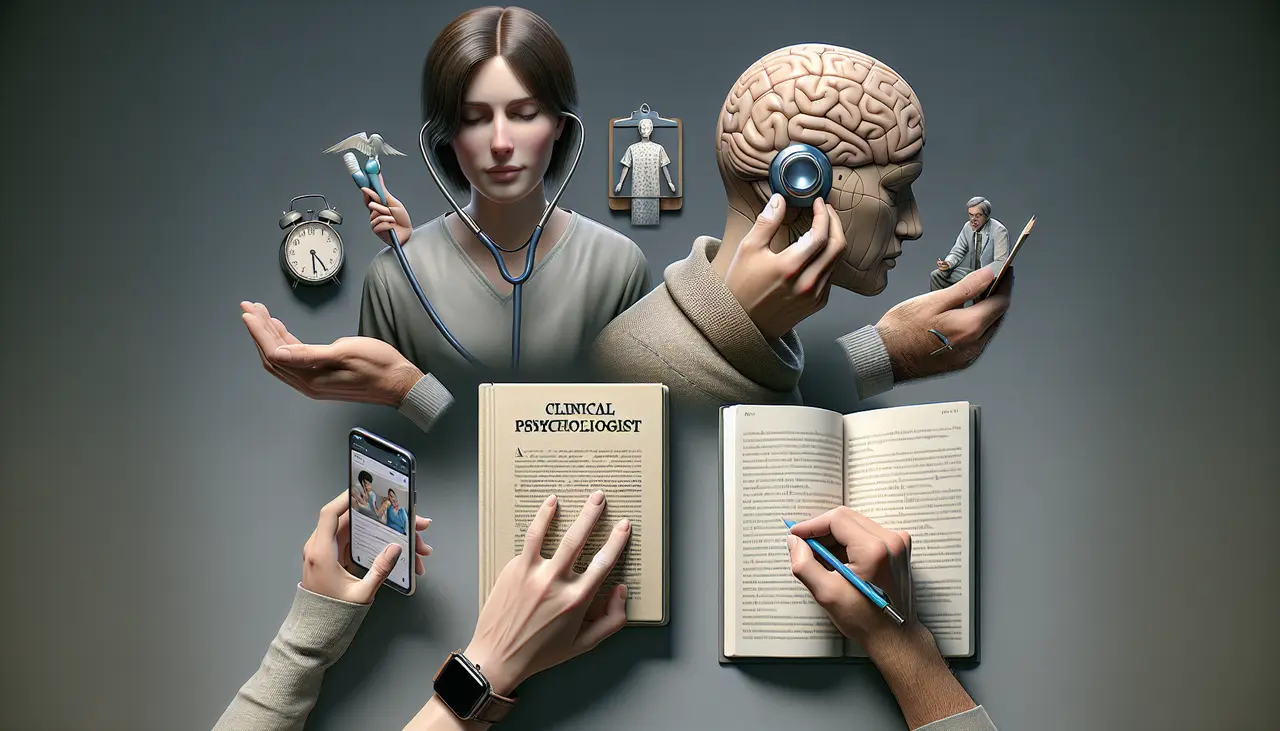Introduction to a Career as a Clinical Psychologist
Becoming a clinical psychologist is all about understanding and helping people with their mental challenges and disorders. It’s a career filled with purpose, but it’s not for everyone. You dive deep into the complexities of the human mind, aiming to heal. This path requires solid education – think years of studying, from undergrad to doctorate. You’ll also need a license to practice, which means passing exams and racking up supervised hours. It’s rigorous, no doubt. But for those driven by the desire to make a difference in others’ lives, it’s incredibly rewarding. This field keeps evolving, so staying sharp and current is part of the game. A career as a clinical psychologist offers a unique opportunity to touch lives on a deep level, guiding individuals toward better mental health and well-being.
Essential Academic Qualifications for Clinical Psychologists
To get going in the field of clinical psychology, a solid educational foundation is a must. At the core, you’ll need a bachelor’s degree in psychology, but that’s just the starting point. The real game changer is a doctoral degree, either a Ph.D. in Psychology or a Psy.D. (Doctor of Psychology). This isn’t a quick journey; it could take anywhere from 5 to 7 years after your undergrad. States also require you to get licensed, which means passing a licensure exam. Plus, many roles demand real-world experience, often achieved through internships or supervised residencies. So gear up for a long haul, but remember, with these academic qualifications, you’re setting yourself up for a fulfilling career helping others navigate their mental health challenges.
Interpersonal Skills for Effective Communication
To thrive as a clinical psychologist, mastering interpersonal skills is non-negotiable. Why? Because the heart of your job involves interacting with people. This means you must be adept at building rapport, genuinely understanding others, and conveying your thoughts and expertise in a way that’s both respectful and clear. First off, active listening is crucial. It’s about fully focusing on the person speaking, understanding their message, and responding thoughtfully. It shows you value what they say and builds trust. Empathy goes hand in hand with this. Putting yourself in someone else’s shoes can transform the way you communicate, making your interactions more compassionate and effective. Then, there’s verbal communication. The way you talk—your tone, clarity, and even your choice of words—matters. It can make complex psychological concepts understandable to those without a background in psychology. Non-verbal communication also plays a pivotal role. Your body language, eye contact, and even your pauses can reinforce your words or, if not aligned, can confuse or alienate the person you’re talking to. Remember, great interpersonal skills enhance your ability to help others, making them foundational for a successful career in clinical psychology.
Understanding and Applying Psychological Therapies
To excel as a clinical psychologist, mastering and applying psychological therapies is key. This means getting really good at different methods to help people manage their mental health. Let’s break it down. Cognitive Behavioral Therapy (CBT) is one you’ve probably heard of. It’s about changing negative thoughts to improve how a person feels. Then there’s Dialectical Behavior Therapy (DBT), which is a bit like CBT but adds tools to manage emotions and improve relationships. Another important one is Psychodynamic Therapy, where the focus is on understanding deep-rooted feelings and experiences. You’ve got to be comfortable with these and more. Each person is different, so knowing a range of therapies helps you tailor your approach. Remember, it’s not just about knowing the theory; it’s about using what you know to make a real difference.
The Importance of Ethical Practices in Clinical Psychology
Ethical practices in clinical psychology are fundamental. They’re about more than just following rules; they protect patients’ mental and emotional well-being. When psychologists stick to ethical guidelines, they build trust with patients. This trust is crucial because, in therapy, people open up about personal and often painful experiences. Imagine you’re sharing something very private, only to find out later that your psychologist wasn’t respecting your confidentiality. That would break the trust, wouldn’t it? Ethical practices also ensure that psychologists do not misuse their influence. They’re in a position of power, and it’s vital they don’t exploit this for personal gain. Ethical guidelines help in making decisions that benefit the patient, not the psychologist’s personal or professional interests. Lastly, psychologists need to be culturally sensitive. People come from diverse backgrounds, and understanding these differences is key. This means being respectful and accepting, not imposing one’s beliefs on others. So, ethical practices are not just about doing no harm; they’re about actively doing good, ensuring respect, and nurturing the therapeutic relationship.
Research Skills and Evidence-Based Practice
In the field of clinical psychology, strong research skills and a firm commitment to evidence-based practice are not just ideal, they’re essential. Here’s why: as a clinical psychologist, you’ll need to sift through piles of studies and articles to find what works best for your clients. It’s not about picking a favorite technique or theory; it’s about what the evidence says is most effective. This involves staying updated with the latest research findings and being able to apply them wisely. You’ll often find yourself asking, “What does the science say?” before making decisions about treatment plans.
Evidence-based practice means your therapy methods are backed by solid research, showing they actually help people. It’s like being a detective, except instead of solving crimes, you’re figuring out the best ways to improve mental health. You’ll need to be able to read research critically, understand statistics, and discern quality studies from those with flaws. This skill set ensures that the strategies you employ are not just your best guess; they’re proven methods that have been rigorously tested and validated.
To sum it up, mastering research skills and evidence-based practice isn’t just about being good at reading studies or loving science. It’s about providing the best care possible, because what works is what heals. And in clinical psychology, what works is what’s been proven through research.
Cultural Competence in a Diverse Society
In today’s world, understanding and respecting cultural differences is not just nice to have, it’s essential, especially in the field of clinical psychology. Cultural competence means you get where people are coming from, respecting their diverse backgrounds, beliefs, and customs. It’s about being skilled and flexible enough to work effectively with people from various cultural backgrounds. So, why does this matter? Because everyone comes with their own set of experiences, values, and ways of understanding the world. If you’re working as a clinical psychologist, this understanding can make a massive difference in how effectively you can help someone. It’s about making sure you don’t just see your clients through your own cultural lens but appreciate their unique perspectives. This competence doesn’t happen overnight. It requires ongoing learning, self-reflection, and adapting your approach as needed. The bottom line? Being culturally competent is crucial in helping you connect with and effectively treat a diverse range of clients. It makes you better at what you do, and honestly, it’s just the right thing to aim for.
Self-Awareness and Reflective Practice for Personal Growth
As a clinical psychologist, self-awareness and reflective practice aren’t just nice-to-have skills; they’re essentials. Why? Because understanding your own feelings, biases, and behaviors can significantly improve how you relate to and help your clients. Self-awareness means recognizing your emotional triggers and knowing when your own experiences might color your professional judgment. Reflective practice goes a step further. It’s about regularly taking a step back and thinking critically about your interactions, decisions, and the therapy sessions you conduct. This isn’t about being too hard on yourself but about learning and growing from each experience. To get going, start a journal. After each session, jot down a few notes. What went well? What didn’t? How did you feel, and why? This process is key to becoming more effective in your role and truly making a difference in your clients’ lives. So, keep it simple, be honest with yourself, and embrace the journey of personal growth.
Managing Stress and Practicing Self-Care
In your journey to becoming a great clinical psychologist, managing stress and practicing self-care aren’t just add-ons; they’re essentials. Think of it this way: you can’t pour from an empty cup. If you’re overwhelmed, it’ll affect your ability to support your clients effectively. Start with basic self-care routines like getting enough sleep, eating well, and exercising. These might sound simple, but they lay the groundwork for resilience.
Stress management techniques such as mindfulness or meditation are more than buzzwords; they’re tools that can keep you grounded when your work life gets hectic. It’s also crucial to set boundaries. Recognize when to say no and learn to prioritize your well-being alongside your professional goals. This might mean scheduling downtime or pursuing hobbies that recharge your batteries.
Remember, your ability to help others greatly depends on how well you take care of yourself. So, make stress management and self-care top priorities. This will not only benefit you but also enhance the quality of care you provide to your clients.
Continual Learning and Professional Development in Clinical Psychology
In clinical psychology, staying at the top of your game means embracing continual learning and professional development. This field changes often; new discoveries, techniques, and theories emerge, reshaping how practitioners approach mental health. To be effective, a clinical psychologist must commit to ongoing education. This isn’t just about ticking boxes for license renewal. It’s about delving into recent research, attending workshops, and maybe even pursuing further degrees or certifications. It’s this hunger for knowledge that allows you to offer the most updated and effective interventions for your patients. Here’s the deal: as you evolve, so does your ability to make a real difference in people’s lives. Whether it’s exploring new therapy modalities or understanding the latest in neuroscience, making learning and development a cornerstone of your career is key. Remember, in this field, being a lifelong learner isn’t optional; it’s essential.


